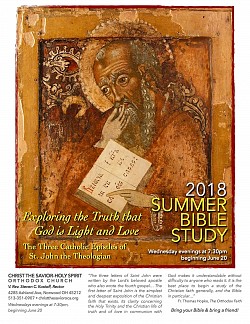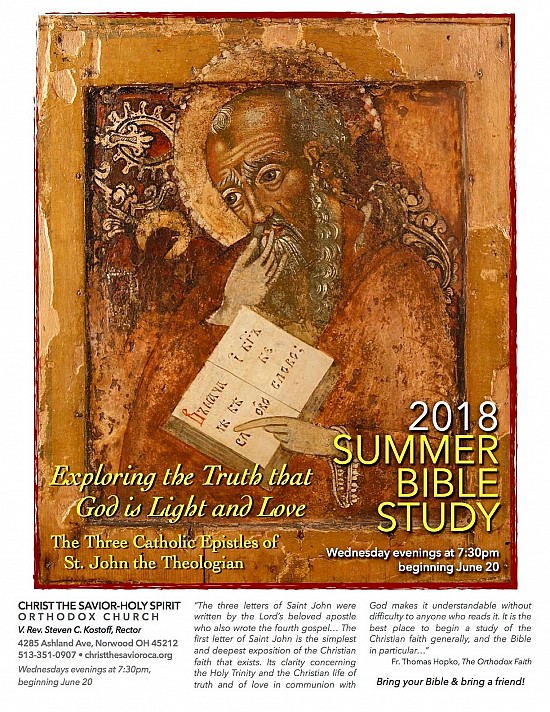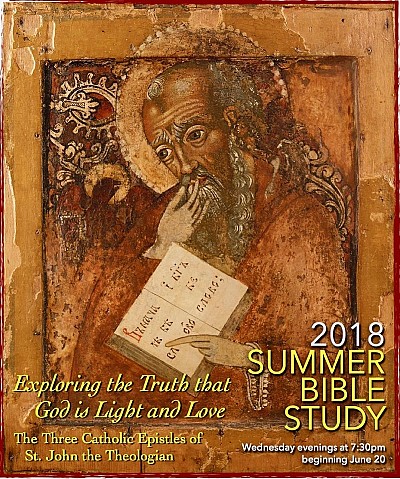Concerning the parish Bible Study, Fr. John Breck, an eminent Orthodox biblical scholar, once wrote the following:
With a few important exceptions, Bible study at the parish level for Orthodox Christians simply does not work. Ask the average parishioner for an honest assessment of his or her experience with Bible study groups and the reply more often than not includes complaints such as "irrelevant," "boring," "one more obligation," or "It's a Protestant import." The reason for these reactions has to do not with the Bible as such, but with the social atmosphere in which we find ourselves. We live today in what is called a post-Christian age in which institutional structures (family, business, state) are no longer governed by Christian principles or informed by Christian morality...
This is only somewhat accurate in describing our parish Bible Study here at Christ the Savior/Holy Spirit. I say that because I can confidently state that parishioners here do not experience our Bible Study as "irrelevant," "boring," "one more obligation," or as a "Protestant import." In fact, I will be so bold as to say that parishioners here would say that our Bible Study is "relevant," "exciting," something "to look forward to," and basically Orthodox in its inspiration. If that was not the case, those same parishioner would not return with regularity from session-to-session and from year-to-year. Our parish Bible Study serves as an antidote to postmodern relativism and skepticism, by imparting Christian teaching and principles that can inform our daily lives. It has got to be the material that we study - the Holy Scriptures as the living Word of God.
In his article, Fr. John continues:
The problem of course lies not with the Bible but with ourselves. We as Orthodox Christians, living in contemporary American culture, need desperately to recover wha we can call the "vision of the Church:" an eschatological vision of the presence and power of the Kingdom of God in our midst. We need to hear the apostolic message that Baptism has already led us beyond death to the newness of Life; that the Eucharist can mean for us here and now a living communion in the life-giving Body and Blood of the glorified Christ. The need, in other words, is to recover a deep and abiding inner sense of our personal and immediate involvement in God's ongoing work of creation, redemption and deification.
Bearing this in mind, I am sending our some questions for discussion at our next session Wednesday evening, when we study I Jn. 2. Some if these issues will overlap with last Wednesday's discussion, by raising some of the themes we touched on briefly last week with a bit more depth.
Come and discover "an eschatological vision of the presence and power of the Kingdom of God in our midst." And join your fellow brothers and sisters in Christ in the process.
Fr. Steven
_____
Study Questions for Session 2
+ As a general approach to I Jn. keep an eye open for clear allusions to the Gospel, especially in similar terminology, images and teaching.
+ In I Jn. 2, Jesus is called the hilasmos of our sins. Since this is usually translated as "expiation," what does it mean to refer to Jesus in this way? What was the extent of the expiatory sacrifice of Christ on the Cross?
+ What is the difference between the role of the Parakletos - "Advocate" - in the Gospel, and Jesus as our "Advocate" in I Jn?
+ What is the tension found in both the Gospel and I Jn. with St. John's use of the word kosmos or "world?"
+ How should we understand the phrase "the love of God" in I Jn. 2:5? Does it refer to God's love for humanity; or to our love for God? Are the two interpretations compatible?
+ There seems to be a contradiction in I Jn. 2:7-11. How is a commandment both "old" and "new" as St. John claims in these verses? And what commandment is he referring to?
+ Who are the "antichrists" mentioned in I Jn. 2?
+ What are the fruits of being anointed by the "Holy One" in I Jn. 2?
+ What does St. John mean by "denying the Father and the Son?"
+ According to St. John who is a "liar?"



